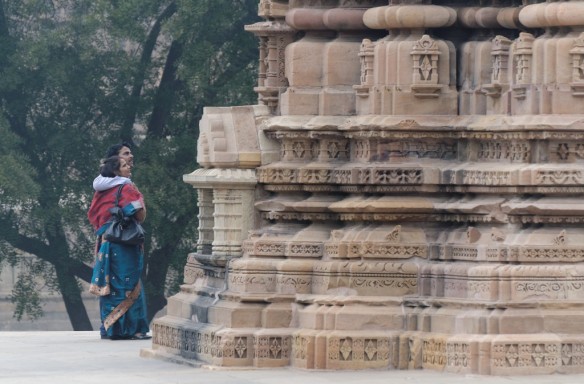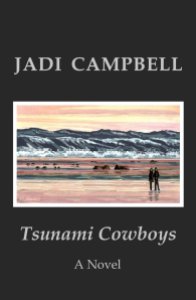Uwe and I put an exclamation point at the end whenever we talk about Khajuraho! We visited last January, and we’re still talking about it.
In the interests of proper grammar I’m leaving out the exclamation point from now on. You may add it in for yourselves if you like.…
When we visited, Khajuraho could only be reached via a long trek on bad roads. Since we’re talking about India, this means the roads are bad indeed.


The driver we’d hired was there to meet us at our hotel in Agra, and off we went. Five bone-jolting hours later we reached our destination.
Along with its inaccessibility, Khajuraho is notorious for 1,000 year old, perfectly preserved, UNESCO World Heritage erotic carvings.
Somehow this site survived a millennia (millennia, people!), in a spot that had no fortresses or fortifications to speak of. The temple complex existed simply for the purpose of worship.
And what worship. Every single inch of the temple buildings are carved in high relief, depicting gods, tender lovers, voluptuous attendants, monkeys, elephants, assistants for the sexual act…. 

 Hundreds of skilled stonemasons were hired to build the site. The Khajuraho region has excellent sandstone, and the sandstone temples were built with granite foundations. All were constructed without mortar! Instead, gravity holds the stones together with mortise and tenon joints.
Hundreds of skilled stonemasons were hired to build the site. The Khajuraho region has excellent sandstone, and the sandstone temples were built with granite foundations. All were constructed without mortar! Instead, gravity holds the stones together with mortise and tenon joints. 


 Some of these stones are megaliths weighing up to 20 tons.
Some of these stones are megaliths weighing up to 20 tons.
The glory of sandstone is that it loans itself to delicate carving. Even viewing the temple walls from the ground we could see the wrinkles in Ganesh’s trunk; the fingernails of the apsaras and the beads in their strands of jewelry; the sheer layers of veils over their thighs and buttocks.
 Uwe vanished almost immediately with his camera, leaving me alone with the young male guide. I could feel my face go red, and it wasn’t a hot flash or sunburn. I was terribly afraid of how embarrassed I was going to be. But the guide pointed out the various depictions of the act of love and spoke in a clear calm voice, explaining the significance (pull your minds of out the gutter, dear readers) in terms of energy, religion, and esoteric philosophy.
Uwe vanished almost immediately with his camera, leaving me alone with the young male guide. I could feel my face go red, and it wasn’t a hot flash or sunburn. I was terribly afraid of how embarrassed I was going to be. But the guide pointed out the various depictions of the act of love and spoke in a clear calm voice, explaining the significance (pull your minds of out the gutter, dear readers) in terms of energy, religion, and esoteric philosophy.
It was mid-January, past the usual Christmas tourist season. It was also a two-week period when northern and central India get swathed in fogs – something smarter tourists than we knew. As a result we had the pleasure of being two of the few Westerners at the site.
Most of the others were Indians on holiday, and I was touched to see that at Khajuraho, this meant young married couples. They walked around the compound, standing in front of particularly erotic carved panels, heads together in discussion.


While only 10% of the carvings depict sexual acts, you can guess which panels elicited the most commentary. These were the love-making couples known as maithunas. Other carvings depict everyday activities: playing musicians, potters, farmers, soldiers on horseback, etc.

The temples were probably built in the one hundred year period between 950 and 1050 AD, during the Rajput Chandella dynasty. According to historical records, by 1100 Khajuraho contained 85 temples covering 20 square kilometers. Roughly 20 temples still stand. They were located 60 kilometers from Mahoba, the medieval capital of the Chandela kingdom.
Khajuraho was mentioned by the Arabic historian Abu Rihan-al-Biruni, in 1022 AD, and by Ibn Battuta, the Moroccan traveler, in 1335 AD.
When Muslim rulers took control, heathen places of worship were systematically destroyed. Ironically, even centuries ago the remoteness of these temples helped secure their survival. Nature did the rest as vegetation and forest reclaimed the site. For years the temples were covered by dense date palm trees which gave the city its name: in Hindi, Khajur = date. (The more ancient name was Vatsa.)
The scenes explain Hinduism’s four goals for life: dharma (right way of living), kama (aesthetic enjoyment), artha (prosperity) and moksha (liberation). The complexity of the geometric layout and the grid pattern of the temples with their circles, squares and triangles, the importance of geographic orientation and bodies of water and the carvings’ iconography is beyond my very weak grasp. Instead, here is an excerpt from the UNESCO website:
Greatly influenced by the Tantric school of thought, the Chandela kings promoted various Tantric doctrines through royal monuments, including temples. Sculptors of Khajuraho depicted all aspects of life. The society of the time believed in dealing frankly and openly with all aspects of life, including sex. Sex is important because Tantric cosmos is divided into the male and female principle. Male principle has the form and potential, female has the energy. According to Hindu and Tantric philosophy, one cannot achieve anything without the other, as they manifest themselves in all aspects of the universe. Nothing can exist without their cooperation and coexistence. In accordance with ancient treaties on architecture, erotic depictions were reserved for specific parts of the temples only. The rest of the temple was profusely covered with other aspects of life, secular and spiritual. Source: UNESCO/CLT/WHC
Khajuraho remained forgotten by the outside world until 1838 when a British army engineer, Captain T.S. Burt, was carried in via palanquin. I laughed so hard when I read that the Victorian officer was shocked by what he found….
Khajuraho!
NOTES :http://en.wikipedia.org/wiki/Khajuraho_Group_of_Monuments
http://www.lonelyplanet.com/india/madhya-pradesh-and-chhattisgarh/khajuraho/history#ixzz3JWuMCco9
http://whc.unesco.org/en/list/240
http://whc.unesco.org/en/list/240/video
Go to my earlier posts Travel Karma & Remind Me Again: What Are We Doing Here? to read about our visits to India. All photogaphs can be enlarged by simply clicking on the image. More of Uwe’s pictures from India and his photography may be viewed at viewpics.de.


